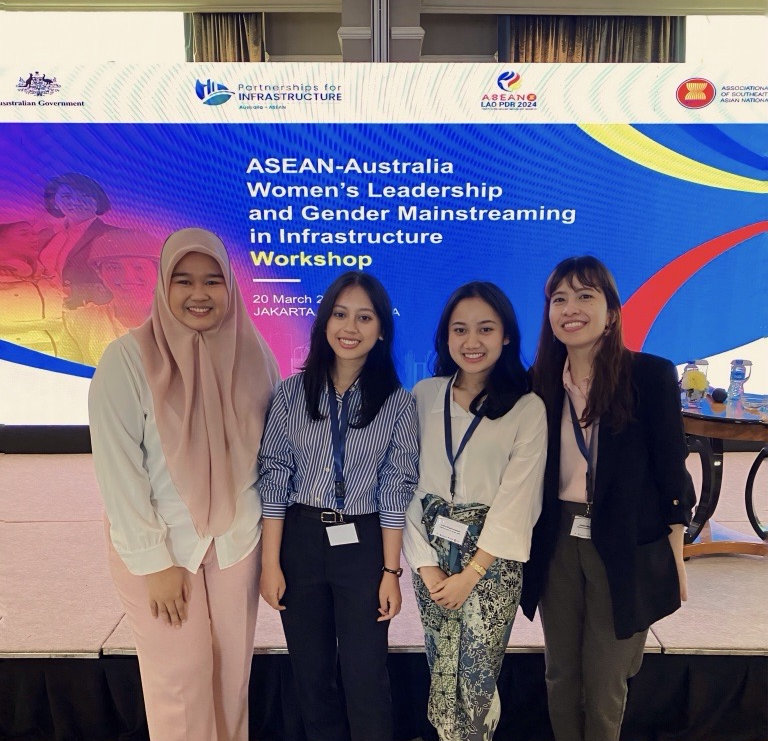i
i
Jakarta, 20 March 2024

Photo 1. ACE representatives in ASEAN-Australia Women’s Leadership and Gender Mainstreaming in Infrastructure
This week, a workshop on ASEAN-Australia Women’s Leadership and Gender Mainstreaming in Infrastructure, co-hosted by The ASEAN Lead Implementing Body for Sustainable Infrastructure (LIB-SI), the ASEAN Secretariat (ASEC) and Australian Government through the Partnerships for Infrastructure (P4I) was held to promote gender equality, enhance regional connectivity, and increase sustainable infrastructure development in ASEAN.
In this opportunity, ACCEPT II participated in the workshop as its alignment in promoting gender equality in the energy sector. The capacity building that is offered by the workshop aims strengthen the regional commitment to empower gender inclusivity in ASEAN. The workshop facilitated a bridge between the speakers and audiences from ASEAN sectoral bodies, ASEAN Member States (AMS), Australia, and Timor Leste to arrange potential strategies in involving more women in infrastructure, particularly in the transport and energy sector. It also provides promising networking opportunity to share experiences and engagement between government, private sector, and non-government organisations.
In the beginning of the event, Chanthasack Bottaphanith, Deputy Director General of Planning and Finance, Ministry of Public Works and Transport, Lao PDR conveyed his opening remarks and highlights the necessity to address gender inclusivity, giving women more opportunities to be involved in each sector. Same perspectives were also delivered by H.E. Tiffany McDonald, Ambassador of Australia to ASEAN during her opening remarks, which emphasised the importance of cross sectorial international collaboration to gain more diverse perspectives and inputs.
The workshop was divided into three discussion sessions. The first session highlighted the importance to address gender considerations in infrastructure policy and development. The session shared examples and the lesson learned from specific approaches, namely gender-responsive budgeting, designated gender focal points, and gender-responsive procurement. The second session presented the key challenges to navigate and key support networks and allies to cultivate women leadership positions in infrastructure. The third session addressed to increase women’s participation and leadership in infrastructure development with practical tool and sectoral case studies from transport and energy sector.
Aldilla Noor Rakhiemah, Senior Research Analyst of ACCEPT II also shared her insights during the discussion session. She brought up the discussion by asking the impact of policy and frameworks to accelerate women inclusion, as well as the best practice and challenges during the implementation. Kate O’ Sullivan, Deputy Secretary (Infrastructure Division), Victoria Department of Treasury and Finance, Australia responded by sharing her work experience where the institution has set a clear target and program support that is translated into capacity building to raise awareness for gender inclusivity.
Aldilla also gave her response about the adaptability of PPP Gender Toolkit that is developed by The World Bank to different countries and cultures. Jane Jamieson, Program Manager of Private Infrastructure Advisory Facility (PPIAF) addressed that the idea to develop PPP Gender Toolkit is to trigger more gender-related conversations that should be in consideration in terms of sectoral planning. She added that the document can be seen as a starting point for more detailed gender sensitive activities in country level. In this case, taking the global knowledge should be prioritised before it is going to be locally conceptualised by the governments or stakeholders.
In addition, Amira Bilqis, Analyst of ACE also questioned the key activity to engage and advocate the energy-gender works in ASEAN and bridging them to the policymaker. The panellist recommended to encourage inclusive consultation for everyone in every sector. Therefore, there will be a comprehensive input to accelerate the energy-gender works in the region.
Deep dive into the energy sector, the workshop facilitated a session on increasing women’s participation in energy infrastructure. The session discussed on the importance to have multisectoral approach and collaboration to increase women involvement in the energy sector.
The workshop clearly delivered the urge to define what is the main issue, who is the target of involvement, and where are the position of the country to address the existing gap in women involvement. An inclusive program is required to support gender mainstreaming among energy and transport sector. From government side, ACCEPT II recommends that a legislation should be drafted as the baseline for program derivatives that is related to energy and transport sector in ASEAN.
(IP)
Join our ASEAN Researchers Network on Climate Change (ARNECC) by registering yourself here. Become a part of our collaborative efforts to address pressing climate challenges and shape a sustainable future.
Detailed information on ACCEPT II can be found at https://accept.aseanenergy.org/
We welcome any future collaboration, please feel free to contact us at [email protected]